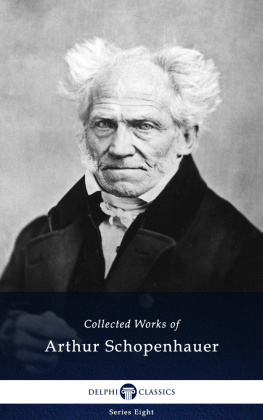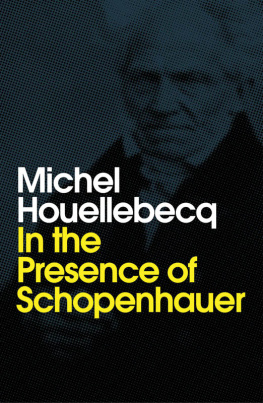The Philosophy of Schopenhauer
Continental European Philosophy
This series provides accessible and stimulating introductions to the ideas of continental thinkers who have shaped the fundamentals of European philosophical thought. Powerful and radical, the ideas of these philosophers have often been contested, but they remain key to understanding current philosophical thinking as well as the current direction of disciplines such as political science, literary theory, comparative literature, art history, and cultural studies. Each book seeks to combine clarity with depth, introducing fresh insights and wider perspectives while also providing a comprehensive survey of each thinker's philosophical ideas.
Published titles
The Philosophy of Gadamer
Jean Grondin
The Philosophy of Merleau-Ponty
Eric Matthews
The Philosophy of Nietzsche
Rex Welshon
The Philosophy of Schopenhauer
Dale Jacquette
Forthcoming titles include
The Philosophy of Deleuze
Peter Sedgwick
The Philosophy of Derrida
Mark Dooley and Liam Kavanagh
The Philosophy of Foucault
Todd May
The Philosophy of Habermas
Andrew Edgar
The Philosophy of Hegel
Allen Speight
The Philosophy of Heidegger
Jeff Malpas
The Philosophy of Husserl
Burt Hopkins
The Philosophy of Kant
Jim O'Shea
The Philosophy of Kierkegaard
George Pattison
The Philosophy of Marx
Mark Neocleous
The Philosophy of Rousseau
Patrick Riley, Sr and Patrick Riley, Jr
The Philosophy of Sartre
Anthony Hatzimoysis
The Philosophy of Schopenhauer
Dale Jacquette
First published in 2005 by Acumen
Published 2014 by Routledge
2 Park Square, Milton Park, Abingdon, Oxon OX14 4RN
711 Third Avenue, New York, NY 10017, USA
Routledge is an imprint of the Taylor & Francis Group, an informa business
Dale Jacquette, 2005
This book is copyright under the Berne Convention.
No reproduction without permission.
All rights reserved. No part of this book may be reprinted or reproduced or utilised in any form or by any electronic, mechanical, or other means, now known or hereafter invented, including photocopying and recording, or in any information storage or retrieval system, without permission in writing from the publishers.
Notices
Practitioners and researchers must always rely on their own experience and knowledge in evaluating and using any information, methods, compounds, or experiments described herein. In using such information or methods they should be mindful of their own safety and the safety of others, including parties for whom they have a professional responsibility.
To the fullest extent of the law, neither the Publisher nor the authors, contributors, or editors, assume any liability for any injury and/or damage to persons or property as a matter of products liability, negligence or otherwise, or from any use or operation of any methods, products, instructions, or ideas contained in the material herein.
ISBN 13: 978-1-84465-008-8 (hbk)
ISBN 13: 978-1-84465-009-5 (pbk)
British Library Cataloguing-in-Publication Data
A catalogue record for this book is available from the British Library.
Designed and typeset in Classical Garamond
by Kate Williams, Swansea.
Contents
For Tina, as always, with love
I came to Schopenhauer indirectly through a prior interest in the philosophy of Wittgenstein. In particular, I wanted to understand what Wittgenstein means in Tractatus Logico-Philosophicus 6.4211, when he says that "Ethics is transcendent. Ethics and aesthetics are one." The secondary literature hinted that Schopenhauer's philosophy might provide the key. While this was a tantalizing clue, it did not by itself resolve my uncertainty, but only led to more and more careful reading and rereading of Schopenhauer's works. It was not long in this process before my original motives for studying Schopenhauer ripened into a lasting involvement with all aspects of his thought on its own terms and for its own sake.
As an undergraduate I read Schopenhauer's Fourfold Root of the Principle of Sufficient Reason and both volumes of The World as Will and Representation in translation. This first exposure to Schopenhauer gave me a rough idea of his philosophy and its relation to the philosophies of Plato and Kant, just as at the time I had only a rough idea of the philosophies of Plato and Kant. It was insufficient background later on to help me clarify what I now see as the early Wittgenstein's debt to Schopenhauer's transcendentalism, not only in the identification of ethics with aesthetics and his concept of the metaphysical subject or philosophical I, but in every aspect of his philosophical semantics and its applications in the Tractatus, including the sign-symbol distinction and picture theory of meaning.
What I discovered in reacquainting myself with Schopenhauer is the explanatory power of his dual aspect conception of the world as Will and representation. However useful the study of Schopenhauer has been to my understanding of later episodes in the history of philosophy, it is his philosophical system standing on its own that has meant increasingly more to my own reflections in metaphysics, ethics and aesthetics, and in my efforts to come to terms with all the comedy and tragedy of the human condition. Schopenhauer combines mid-nineteenth-century scientific philosophy with Eastern mysticism and a penetrating if grotesque insight into the problems of life. The author's captivating philosophical prose, the extraordinary rancour and passion that shine through on every page, and the ingenious fitting together of so many diverse kinds of knowledge from so many different branches of study, contribute to making Schopenhauer's thought a most audacious philosophical enterprise, with an astonishing array of implications for metaphysics, epistemology, ethics, political philosophy, aesthetics, philosophy of logic, mathematics, science and religion. We delve into Schopenhauer's life work not merely as indispensable to a complete understanding of the Western tradition, or of nineteenth-century German idealism, but because Schopenhauer's reflections, if true, no matter how abstruse, offer something that philosophy in our more cynical and still positivistic age has abandoned as beyond the reach of responsible enquiry: a single key to unlock all the philosophical difficulties and religious and psychological mysteries surrounding the facts of life and death.
I approach Schopenhauer critically, as a logician and dyed-in-the-wool analytic philosopher. I do so, however, I believe, with more genuine sympathy for his project and its conclusions than most scientifically trained scholars typically take away from his pages. While there are numerous excellent introductions to Schopenhauer's thought, and new studies on special topics in his philosophy appear every several years, I devote more attention than I have seen in other expositions to Schopenhauer's main and most controversial contribution to metaphysics - the arguments by which he hopes to prove that thing-in-itself is Will. My reason for examining Schopenhauer's reasoning in such detail is that it is specifically by these considerations that he claims to have surpassed Kant as the greatest of all his philosophical precursors. Schopenhauer enthusiastically adopts Kant's distinction between phenomena and thing-in-itself. He nevertheless rejects Kant's attempt to demonstrate the existence of thing-in-itself, and, in the process, more significantly, he denies Kant's conclusion that thing-in-itself is unknowable, merely conceivable, noumenon. By offering a glimpse of the hidden nature of thing-in-itself as Will, Schopenhauer goes far, perhaps too far, beyond his teacher. He thereby sets in motion a cascade of implications for other fields of philosophy in the understanding of science, natural history, religion, art and every phenomenal and transcendental aspect of social and political reality. Schopenhauer pursues many of these finer points in his later writings and revised editions of his major works, all of which can be understood as supplements to The World as Will and Representation.













